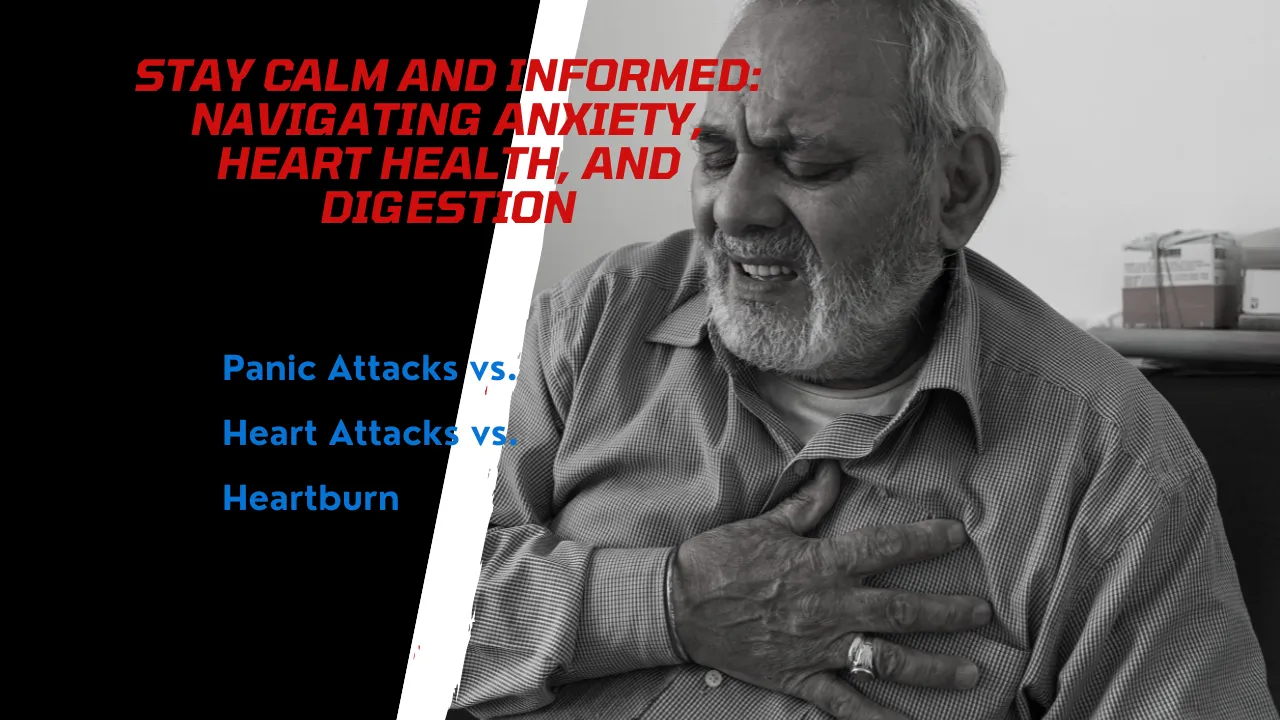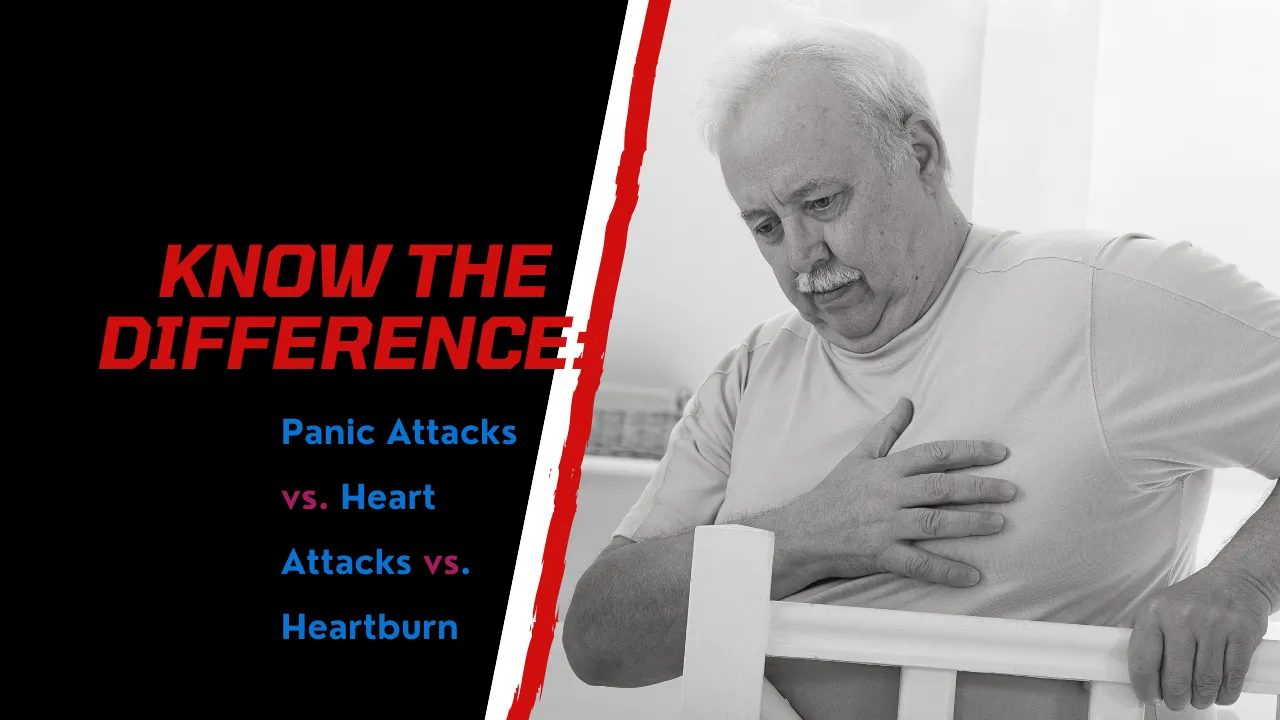Panic attacks, heart attacks, and heartburn are three distinct conditions that can cause discomfort, but they have different causes and symptoms.
Panic attacks are sudden episodes of intense fear or anxiety that trigger severe physical reactions, even when there is no real danger. Symptoms can include rapid heartbeat, shortness of breath, dizziness, and chest pain, which can sometimes be mistaken for a heart attack. However, panic attacks are primarily psychological and usually arise from anxiety disorders or stress.
On the other hand, heart attacks occur when blood flow to the heart is blocked, often due to a buildup of plaque in the arteries. This can lead to severe chest pain, tightness, pressure, and other symptoms such as nausea, sweating, and pain radiating to the arm or jaw. Heart attacks are a medical emergency and require immediate attention.
Heartburn is a digestive issue caused by stomach acid flowing back into the esophagus. It typically presents as a burning sensation in the chest or throat, often after eating. Heartburn is less severe than a heart attack and is usually related to dietary choices or conditions such as gastroesophageal reflux disease (GERD).
In summary, while panic attacks, heart attacks, and heartburn can share some similar symptoms, like chest pain, they are fundamentally different conditions with unique causes and treatments. It’s essential to identify them so that they can seek appropriate care correctly.
Comparison of Panic Attacks, Heart Attacks, and Heartburn
While these conditions can sometimes be confused, they are distinct medical conditions with different causes, symptoms, and treatments.
Panic Attack
- Cause: Typically triggered by stress, anxiety, or other psychological factors.
- Symptoms: Rapid heartbeat, sweating, trembling, shortness of breath, chest pain, nausea, dizziness, feeling like you’re going to die or lose control.
- Duration: Usually peaks within a few minutes and subsides within 30 minutes.
- Treatment: Cognitive-behavioral therapy, medication, and relaxation techniques.
Heart Attack
- Cause: Blockage of a coronary artery, often due to a blood clot.
- Symptoms: Chest pain or discomfort, often described as a squeezing or pressure that may spread to the arm, shoulder, neck, jaw, or back. Shortness of breath, nausea or vomiting, sweating, lightheadedness, or fainting.
- Duration: Can last for several minutes or longer.
- Treatment: Immediate medical attention, including medications to dissolve the clot and restore blood flow.
Heartburn
- Cause: Backflow of stomach acid into the esophagus.
- Symptoms: A burning sensation in the chest, often described as heartburn. Other symptoms may include a bitter taste in the mouth, difficulty swallowing, or chest pain.
- Duration: Can last for several minutes or hours.
- Treatment: Antacids, lifestyle changes (avoiding triggers like spicy foods, alcohol, and smoking), and prescription medications in severe cases.
Comparison of Panic Attacks, Heart Attacks, and Heartburn – Key Differences:
- Cause: Panic attacks are psychological, heart attacks are physical due to a blockage, and heartburn is caused by acid reflux.
- Symptoms: While some symptoms may overlap, the intensity and nature of the symptoms are different.
- Duration: Panic attacks are typically shorter, heart attacks can last for an extended period, and heartburn can be intermittent.
- Treatment: Panic attacks require psychological interventions, heart attacks require immediate medical attention, and heartburn can often be managed with over-the-counter medications or lifestyle changes.
Here are some home remedies that may help alleviate heartburn:
- Baking soda: Mix a teaspoon of baking soda in a glass of water and drink it slowly.
- Apple cider vinegar: Mix a tablespoon of apple cider vinegar in a glass of water and drink it slowly.
- Ginger: Drink ginger tea or chew on ginger to help ease heartburn symptoms.
- Aloe vera: Drink aloe vera juice or add gel to your smoothies to soothe your digestive system.
- Chamomile tea: Drink chamomile tea to help reduce inflammation in your digestive tract.
Preventing Panic Attacks, Heart Attacks, and Heartburn: A Comparison
While these three conditions may share some symptoms, they have distinct causes and require different prevention strategies.
Panic Attacks
- Causes: Often triggered by stress, anxiety, or underlying mental health conditions.
- Prevention:
- Therapy: Cognitive-behavioral therapy (CBT) can help identify and manage triggers.
- Stress Management: Techniques like meditation, yoga, and deep breathing can reduce stress.
- Medication: In some cases, medication may be prescribed to help manage anxiety or underlying mental health conditions.
Heart Attacks
- Causes: Primarily due to atherosclerosis, a buildup of plaque in the arteries leading to the heart.
- Prevention:
- Healthy Lifestyle: A balanced diet, regular exercise, and avoiding smoking are crucial.
- Medication: For those at high risk, medications like statins, beta-blockers, and aspirin may be prescribed.
- Regular Checkups: Regular medical checkups, including blood tests and heart screenings, can help identify and manage risk factors.
Heartburn
- Causes: Occurs when stomach acid flows back up into the esophagus.
- Prevention:
- Dietary Changes: Avoid triggers like spicy foods, alcohol, and caffeine.
- Lifestyle Modifications: Elevate your upper body while sleeping, avoid lying down after eating, and manage stress.
- Medication: Over-the-counter antacids or prescription medications can help neutralize stomach acid.
Preventing Panic Attacks, Heart Attacks, and Heartburn – Key Differences:
| Condition | Causes | Prevention Strategies |
|---|---|---|
| Panic Attacks | Mental health, stress | Therapy, stress management, medication |
| Heart Attacks | Atherosclerosis | Healthy lifestyle, medication, regular check-ups |
| Heartburn | Acid reflux | Dietary changes, lifestyle modifications, medication |
The Interplay of Obesity and Health Conditions
Obesity can significantly increase the risk of developing various health conditions, including panic attacks, heart attacks, and heartburn.
Here’s a breakdown of these relationships:
Obesity and Panic Attacks
- Indirect Link: While obesity is not a direct cause of panic attacks, it can contribute to factors that increase the risk, such as:
- Stress and Anxiety: Obesity can lead to social isolation, discrimination, and low self-esteem, which can contribute to stress and anxiety.
- Sleep Disorders: Obesity is often associated with sleep apnea and other sleep disorders, which can disrupt sleep and contribute to anxiety and panic.
Heart Attacks and Obesity
- Direct Link: Obesity is a significant risk factor for heart disease, which can lead to heart attacks. Excess weight can contribute to:
- High Blood Pressure: Obesity increases the workload on the heart, leading to elevated blood pressure.
- High Cholesterol: Obesity is often associated with high levels of LDL (“bad”) cholesterol and low levels of HDL (“good”) cholesterol.
- Type 2 Diabetes: Obesity can increase the risk of developing type 2 diabetes, which is a significant risk factor for heart disease.
Obesity and Heartburn
- Direct Link: Obesity can contribute to heartburn by increasing pressure on the lower esophageal sphincter, a muscle that prevents stomach acid from flowing back up into the esophagus. This condition is known as gastroesophageal reflux disease (GERD).
Source & Credits:
https://www.healthline.com/health/heart/heart-attack-vs-heart-failure#heart-attack
https://www.mayoclinic.org/diseases-conditions/heart-disease/in-depth/



Innovation is transforming healthcare for the better!
Thanks
Thanks for sharing. I read many of your blog posts, cool, your blog is very good. https://www.binance.com/de-CH/register?ref=UM6SMJM3
Thanks for sharing. I read many of your blog posts, cool, your blog is very good.